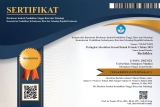Standard Clauses: Measuring Dilemmas in Theory
Abstract
The study aims to measure this dilemma through the theories of natural law, utilitarianism, and positivism. It employs a qualitative approach using library research and normative juridical analysis. Despite their role in enhancing transactional efficiency, standard clauses often obscure critical rights and responsibilities, particularly for consumers who lack the bargaining power or legal literacy to fully comprehend or negotiate contract terms. This condition is increasingly urgent in the context of digital transactions on e-commerce platforms, etc where standard clauses are not only more prevalent but also more opaque. Existing scholarship has yet to explore how consumer legal literacy—or the lack thereof—affects the understanding, acceptance, and contestation of standard clauses in the digital marketplace. This study fills that gap by integrating legal theory with a critical analysis of consumer awareness, offering a novel perspective on the intersection between legal formalism and substantive justice in contemporary consumer contracting. The results indicate that standard clauses are deemed unjust based on natural law theory due to their formulation often violating universal moral principles, which demand mutual agreement and fairness for all parties. According to utilitarian theory, standard clauses are beneficial if they serve all parties; however, since they mainly benefit business actors, the usefulness is limited and creates imbalance. Meanwhile, positivist theory considers standard clauses legally valid as long as they adhere to the pacta sunt servanda principle—once written and agreed upon, the contract is binding law for the parties. Although standard clauses promote business efficiency, the imbalance in bargaining power may disadvantage consumers, who must therefore critically assess their ability to accept or reject the contract.
Keywords
Full Text:
PDFReferences
Agus Saiful Adib, Doddy Kridasaksana, A. Heru Nuswanto. “Penerapan Klausula Baku Dalam Melindungi Konsumen Pada Perjanjian Jual Beli Melalui E-Commerce.” Jurnal Dinamika Sosial Budaya 17, no. 1 (2015): 122. https://doi.org/10.26623/jdsb.v17i1.508.
Durovic, M., and J. Poon. “Consumer Vulnerability, Digital Fairness, and the European Rules on Unfair Contract Terms: What Can Be Learnt from the Case Law Against TikTok and Meta?” Journal of Consumer Policy 46, no. 4 (2023): 419–43. https://doi.org/10.1007/s10603-023-09546-7.
Ginting, Miko Susanto. “Menegaskan Kembali Keberadaan Klausula Baku Dalam Perjanjian.” Jurnal Hukum Dan Peradilan 3, no. 3 (2014): 223–36.
Iskandar, M Roji. “Pengaturan Klausula Baku Dalam Undang-Undang Perlindungan Konsumen Dan Hukum Perjanjian Syariah.” Amwaluna: Jurnal Ekonomi Dan Keuangan Syariah 1, no. 2 (2017): 200–216. https://doi.org/10.29313/amwaluna.v1i2.2539.
Korobkint, Russell, Rachel Croson, Christoph Engel, Sam Fraidin, Chris Guthrie, Bentley Macleod, Jeff Rachlinski, et al. “Bounded Rationality , Standard Form Contracts , and Unconscionability Percent of All Contracts Did Not Resemble the Platonic Ideal of a List Of.” The University of Chicago Law Review 70, no. 4 (2023): 1203–95.
Lagioia, F., Jabłonowska, A., Liepina, R., & Drazewski, K. “AI in Search of Unfairness in Consumer Contracts: The Terms of Service Landscape.” Journal of Consumer Policy 45, no. 3 (2022): 481–536.
Loos, M., & Luzak, J. “Wanted: A Bigger Stick. On Unfair Terms in Consumer Contracts with Online Service Providers.” Journal of Consumer Policy 39 (2016): 63–90.
Mandle, Jon. Rawls’s “A Theory of Justice”: An Introduction. 1st ed. England: Cambridge Universitry Press, 2009.
Mbilufeh, Mbieh Rebecca. “A Critical Examination of Standard Form Contracts and Its Impact on Consumers in Cameroon.” International Journal of Legal Developments and Allied Issues 8, no. 5 (2022): 36–51.
Melisa Aquaria Putri S. “Kedudukan Klasula Baku Dalam Perjanjian Berdasarkan Undang-Undang Nomor 8 Tahun 1999 Tentang Perlindungan Konsumen.” Jurnal Gagasan Hukum 2, no. 02 (2020): 122–34. https://doi.org/10.56301/juris.v7i2.1043.
Novia Rani Aliftian Hadi, Djulaeka. “Peranan BPSK Dalam Sengketa Perjanjian Kredit (Studi Putusan Mahkamah Agung Nomor 592 K/Pdt.Sus BPSK/2016).” Rechtidee 13, no. 2 (2018): 2018.
Pratiwi, Endang, Theo Negoro, and Hassanain Haykal. “Teori Utilitarianisme Jeremy Bentham: Tujuan Hukum Atau Metode Pengujian Produk Hukum?” Jurnal Konstitusi 19, no. 2 (2022): 269–93. https://doi.org/10.31078/jk1922.
Purwanto, Harry. “Keberadaan Asas Pacta Sunt Servanda Dalam Perjanjian Internasional.” Mimbar Hukum - Fakultas Hukum Universitas Gadjah Mada 21, no. 1 (2012): 155–70. https://doi.org/10.22146/jmh.16252.
Putu Laksmi Noviyana, & Dewa Gede Pradnya Yustiawan. “Contractual Fairness in International Trade: An Analysis of Business Law Standards.” International Journal of Law, Crime and Justice 2, no. 1 (2025): 174–186.
Romires, Fadel Edo. “Penggunaan Klausula Baku Dalam Perjanjian E-Commerce Ditinjau Dari Perspektif Perlindungan Konsumen.” Jurnal Inovasi Penelitian 3, no. 4 (2022). http://www2.warwick.ac.uk/fac/sci/whri/research/mushroomresearch/mushroomquality/fungienvironment%0Ahttps://us.vwr.com/assetsvc/asset/en_US/id/16490607/contents%0Ahttp://www.hse.gov.uk/pubns/indg373hp.pdf.
Sekararum Intan Munggaran, Sudjana, Bambang Daru Nugroho. “Perlindungan Konsumen Terhadap Pencantuman Klausula Baku Dalam Perjanjian” 2, no. 2 (2019). http://jurnal.fh.unpad.ac.id/index.php/jad/issue/archiveKORESPONDENPENULIS.
Takasenseran, Mauritz Pray. “Perjanjian Antara Bank Dan Nasabah Menurut Undang-Undang Nomor 10 Tahun 1998.” Lex Et Societatis IV, no. 7 (2016): 41–48.
Triwardini, Arnelia. “BPKN RI Paparkan Catatan Akhir Tahun 2024, Terima 1733 Pengaduan Selama Tahun 2024.” Kabar DKI, 2024.
Valda, Faradilla Meisya. “Kedudukan Asas Proporsionalitas Dalam Perjanjian Timbal Balik Abstrak.” Pemuliaan Keadilan 2, no. 2 (2025): 2025.
Yeager, Timothy J. “The Coase Theorem: The Link to Institutions.” In Institutions, Transition Economies, And Economic Development, 1st ed., 10. New York: Routledge, 2018. https://doi.org/https://doi.org/10.4324/9780429499760.
DOI: https://doi.org/10.21107/ri.v20i1.29842
Refbacks
- There are currently no refbacks.

Rechtidee is licensed under a Creative Commons Attribution-ShareAlike 4.0 International License.
Indexing and Abstracting:












